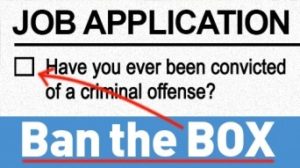You Could be Guilty of a Misdemeanor…
…If your Company Does Any of the Following in 2018!

#1 – If you don’t update your hiring practices! That is, as we ring in 2018, California Assembly Bill No. 168 mimics other states such as Oregon, Massachusetts, and Delaware, and the precious cities of San Francisco and New York City in making it illegal (misdemeanor) to rely on an applicant’s prior salary history as a factor in determining whether to offer employment or what salary to offer an applicant. That’s right! Employers may no longer, orally or in writing, directly or indirectly, seek salary information about a candidate! It’s true! This includes both an applicant’s rate of compensation as well as other benefits (total compensation). This applies to public (government) and private employers.
Any exceptions to this lovely new development in the challenging-enough-world of recruiting; with the California unemployment rate at 4.0% and the national unemployment rate at 4.1% (November 2017)? Why yes, since you asked, there are two exceptions:
- You may use salary history information that is publicly available under federal or state law.
- You may rely and use salary history only if an applicant voluntarily and without prompting self-discloses their salary history. Good luck with that one.
That’s right, that stack of blank applications sitting at the receptionist’s desk and that page on your you just installed will all need modifications. There are two approaches:
- Eliminate all questions or blanks to be filled in relating to past salary. Just take them off, do away with them, kaput! This is my recommendation. This includes any interview guideline questions that might be used on a panel or a telephone screening call, utilized by a well-meaning, but yet uninformed member of the recruitment team, OR
- (and I only add this second choice because I know you’re going to ask or worse yet, just try it…and I might as well address it now) Add ‘OPTIONAL’ or ‘VOLUNTARY’ where you have a space to or prompt to gain passed salary information. C’mon, you know this was your first reaction!
I strongly discourage this course of action because it always gets back to the statement that begins “Well, you honor, it’s like this….” (never ends well). Follow me here…just as compelling an argument to your ‘well-you-honor’ speech could be made that, of course someone applying for a job would want to convey as much information as it appeared the prospective employer was seeking and therefore be construed by the plaintiff that it seemed less than ‘optional’, but I digress. Choose your poison. I’m here to help.
#2 – If you continue to screen out convicts! No, it’s not an urban legend—Effective January 1, 2018, with the passing of Assembly Bill No. 1008, California’s Fair Employment & Housing Council (FEHC) has chosen to follow the federal Equal Employment Opportunity Commission’s (EEOC’s) precedence, which states that employer’s use of an individual’s criminal history in making employment decision, may in some instances, violate the prohibition against employment discrimination.

In this case, such a violation may occur when an employer treats criminal history information differently for different applicants or employees, based on their race or national origin.
The initial burden of demonstrating that considering the criminal history has an adverse impact, as set forth in the regulations, is that of the applicant or employee.
However, once the claim has been stated, the employer must then show/demonstrate that the policy/practice of treating the criminal history information of one or more applicants differently than that of other applicants’ criminal history information is justifiable because it is both:
- Job related; and
- Consistent with business necessity. Business necessity is defined, in this case, as the existence of an overwhelming, legitimate, business purpose such that it would be necessary to insure the safety and efficiency of the business operation.
CAUTION: Even when an employer has shown that its policy is job-related, an applicant or employee may still prevail on a claim by showing that there is a less discriminatory means to achieve a particular business necessity.
Criminal History Now Prohibited from Consideration in Employment Decisions:
- Arrest or detention not resulting in conviction;
- Referral to or participation in a pretrial or post-trial diversion program;
- Judicially dismissed or ordered sealed, expunged, or statutorily eradicated conviction;
- Arrest, detention, processing, diversion, supervision, adjudication, or court disposition that occurred while a person was a juvenile; and
- Non-felony marijuana possession conviction that is two or more years old.
NOTE: Other Conditions Apply, such as:
- State or local agency employers may not ask applicants to disclose criminal conviction history until after the employer has decided that an applicant meets the minimum employment qualifications.
- Employers are still subject to federal or state laws or regulations that prohibit individuals with certain criminal records from holding particular positions or occupations or mandate a screening process employers are required or permitted to utilize before employing individuals in such positions or occupations. (e.g., 21 U.S.C. § 830(e)(1)). Examples include, but are not limited to:
- Peace officers,
- Individuals at health facilities where they will have regular access to patients, and
- Individuals at health facilities or pharmacies where they will have access to medication or controlled substances.
- Local laws or city ordinances may further restrict employers from inquiring about applicant or employee’s criminal history.
- Employers who conduct background check or investigative consumer reports are still subject to comply with the Fair Credit Reporting Act (FCRA) and the California Investigative Consumer Reporting Agencies Act.
Adverse Impact of Criminal Conviction
Criminal history information can be obtained from a wide variety of sources including court records. However, if an employer obtains an applicant’s or employee’s criminal history from a Consumer/Credit Reporting Agency (CRA), the employer must, if a criminal conviction qualifies for an adverse hiring action, :
- Provide the applicant or employee with a Pre-Adverse Action Notice indicating his/her disqualifying conviction
- Provide the applicant with a reasonable opportunity to present evidence that the information is factually inaccurate before the employer sends the Adverse Action Letter.
If employee or applicant presents evidence that the information is factually inaccurate, the employer cannot lawfully consider the inaccurate information in the employment decision.
Best practices would dictate that you pay close attention to the use of any criminal history in an employment decision and review all of your policies, procedures**, and assessments to ensure compliance with the FCRA and the California Investigative Consumer Reporting Agencies Act (ICRAA).
This would include any questionnaires and screening pages on recruitment sites such as, but not limited to: Brass Ring, Monster, Indeed, etc. where salary fields on the employment history information are no longer present.
At the time of this writing, recruitment site CareerBuilder.com provides clients with the option to hide the salary field on the employment history page of the invitation, so the information is not collected on your candidates. Other recruitment sites would be wise to follow suit to support the dynamic needs of their clients, as they adapt to new legislation surrounding the activities of employment recruitment.
#3 – Prohibiting Employees from Discussing Their Salaries, Benefits, or other Working Conditions! Workers have been protected for decades (more than 80 years now) from retaliation from employers for discussing their pay. Yet pay secrecy policy may still remain. This oversight prompted President Barrack Obama to sign an Executive Order in April of 2014, bringing attention to the unlawful practice and reminding employers of their employees’ rights to talk together about things that matter to them at work… including pay.

Don’t get caught being 80 years behind the times! It will cost you dearly! Here’s what may happen:
- Your company can be ordered to provide back pay to wrongfully terminated employees; and/or
- Your company can be ordered to offer former employees their old jobs back; and/or
- Your company can lose current and future federal contracts.
Need help getting with the times, contact us!
